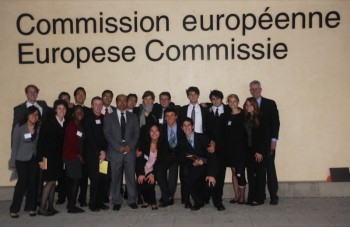Economics Class Tours Brussels, Frankfurt

Visiting Professor of Economics Biswajit Banerjee (center), Parker Snowe '79 (far left) and the economics class at the European Commission.
Details
Eurozone leaders such as German Chancellor Angela Merkel and French President Nicolas Sarkozy met at the European Commission (EC) in Brussels on October 26 for talks on the continent's worsening debt crisis. But just days earlier, that same building (and, in fact, some of the same rooms) played host to a different delegation interested in Europe's current economic situation: a crew of Haverford undergraduates.
Over fall break, Visiting Professor of Economics Biswajit Banerjee and the 17 students enrolled in his course, Economics of Transition and Euro Adoption in Central and Eastern Europe, embarked on one of the most ambitious class trips in the College's history. The group, which also included Professor of History Linda Gerstein and Director of the Center for Peace and Global Citizenship (CPGC) Parker Snowe '79, went to Brussels, Belgium, and Frankfurt, Germany, to attend lectures at the EC, the European Central Bank and the Frankfurt School of Finance and Management.
The students, who have been studying the history of the Euro as part of their exploration of the Central and Eastern European transition from communism to market-planned economies, had a front-row seat to history being made as they sat in rooms that usually offer extremely limited access and heard lectures created especially for their group by researchers, advisors and high-level experts at the different organizations.“It was six weeks of lectures in one week!” says Jacob Lowy '14, who kept a blog of his class' experience.
“Things are unfolding so rapidly in Europe that some of the presentations that were state-of-the-art during our visit have fallen apart and new solutions are being suggested now,” says Banerjee.“But because the students listened to the earlier presentations, they can keep abreast of what is happening, and they're all very excited. So I think the trip was very, very special and very timely.”
Banerjee, an economist who, prior to joining Haverford's faculty in 2009, worked for 26 years at the International Monetary Fund (IMF), had previously taken students to visit the IMF headquarters in Washington, D.C. That trip was such a success that he wanted to give his students a first-hand look at the current economic crisis by visiting the European Central Bank and the EC. Utilizing his contacts in these institutions, both of which are unaccustomed to hosting American undergraduates, he was able to arrange tailor-made lectures for the students. He also arranged for special talks in the burgeoning field of microfinance at the Frankfurt School of Finance and Management. All in all, it took a year to organize the trip and arrange for its funding.
“When I first learned about the class, I couldn't believe [the CPGC and the Provost's office] would fund everything for us and prepare everything for us,” says economics major Timothy Ibbotson-Sindelar '13.“ We were told to get our passport ready, pack our bags, and they prepared everything else, which meant everyone got to have an amazing experience even if you were on financial aid. That was really cool.”
For the students, the trip made their classwork come alive. They got to see how policy decisions are made, argue about the future of the Euro and discover the real-world implications of what they are studying in the classroom.
“You've got this group of 27 states with different nationalities, different languages, different cultures, different experiences, different biases,” says Lowy.“And they're all trying to work together to develop this single market and this single common currency, while still maintaining their own sovereignty.” It's a project he finds all the more impressive given the long history of inter-European warfare that continued through the 1940s.“I thought it was cool that the member states are taking it upon themselves to make this happen.”
“To me, [the lectures] were a reminder that when you want to get something done, it's a complex process,” says Ibbotson-Sindelar.“[At the EC] there are people who had to study countries specifically and look at very, very small parts of the economy. Their whole lives are devoted to learning about the interaction between [economic policies] and their effects on a country's economy. It expanded my idea of what I could do as someone who is going to graduate with an economics major.”
One student, Bryn Mawr College senior Gabrielle Marangell, was so inspired by what she learned on the trip that it influenced her forthcoming senior thesis, which she now plans to focus on the causes and consequences of the European economic crisis.
The issues currently facing some Euro area countries, such as macroeconomic instability and unsustainable sovereign debt, were equally problematic during the 1990s, notes Marangell, when the post-communist nations were in transition.“The European study tour illuminated these connections and showed us how our studies at Haverford are extremely relevant,” she says.
It wasn't all work, however, for the 17 students, who found time for bike rides, long walks, food sampling and a day trip to the medieval city of Bruges. They also enjoyed the trip as an important bonding experience with their classmates.
“We were completely engaged with one another and dependent on one another for fun and entertainment and everything,” says Ibbotson-Sindelar.“All my classmates became people that I thought about during that week. ‘Family' may be a bit of a strong word, but basically they were my family for that week.”
The European sojourn was such a success that Banerjee is already plotting his next international field trip.
During the group's visit to the EC, a staff member said,“Your next visit should be to China.”
“He looked at me and I was smiling,” recalls Banerjee.“And he said, ‘What?' And I said, ‘I'm already thinking about it.' ”
--Rebecca Raber



